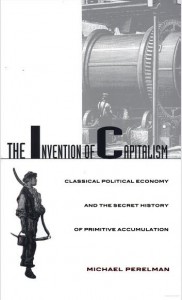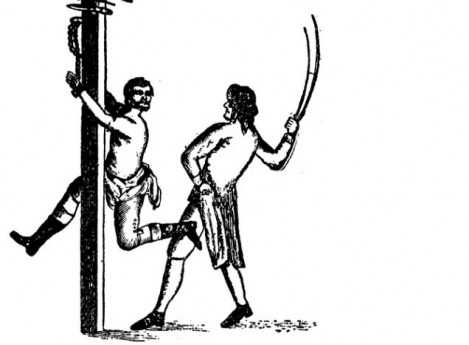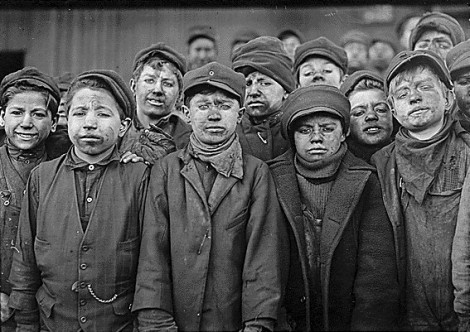“…everyone but an idiot knows that the lower classes must be kept poor, or they will never be industrious.”
—Arthur Young; 1771
Our popular economic wisdom says that capitalism equals freedom and free societies, right? Well, if you ever suspected that the logic is full of shit, then I’d recommend checking a book called The Invention of Capitalism, written by an economic historian named Michael Perelmen, who’s been exiled to Chico State, a redneck college in rural California, for his lack of freemarket friendliness. And Perelman has been putting his time in exile to damn good use, digging deep into the works and correspondence of Adam Smith and his contemporaries to write a history of the creation of capitalism that goes beyond superficial The Wealth of Nations fairy tale and straight to the source, allowing you to read the early capitalists, economists, philosophers, clergymen and statesmen in their own words. And it ain’t pretty.

One thing that the historical record makes obviously clear is that Adam Smith and his laissez-faire buddies were a bunch of closet-case statists, who needed brutal government policies to whip the English peasantry into a good capitalistic workforce willing to accept wage slavery.
Francis Hutcheson, from whom Adam Smith learned all about the virtue of natural liberty, wrote: ”it is the one great design of civil laws to strengthen by political sanctions the several laws of nature. … The populace needs to be taught, and engaged by laws, into the best methods of managing their own affairs and exercising mechanic art.”
Yep, despite what you might have learned, the transition to a capitalistic society did not happen naturally or smoothly. See, English peasants didn’t want to give up their rural communal lifestyle, leave their land and go work for below-subsistence wages in shitty, dangerous factories being set up by a new, rich class of landowning capitalists. And for good reason, too. Using Adam Smith’s own estimates of factory wages being paid at the time in Scotland, a factory-peasant would have to toil for more than three days to buy a pair of commercially produced shoes. Or they could make their own traditional brogues using their own leather in a matter of hours, and spend the rest of the time getting wasted on ale. It’s really not much of a choice, is it?
But in order for capitalism to work, capitalists needed a pool of cheap, surplus labor. So what to do? Call in the National Guard!
Faced with a peasantry that didn’t feel like playing the role of slave, philosophers, economists, politicians, moralists and leading business figures began advocating for government action. Over time, they enacted a series of laws and measures designed to push peasants out of the old and into the new by destroying their traditional means of self-support.

“The brutal acts associated with the process of stripping the majority of the people of the means of producing for themselves might seem far removed from the laissez-faire reputation of classical political economy,” writes Perelman. “In reality, the dispossession of the majority of small-scale producers and the construction of laissez-faire are closely connected, so much so that Marx, or at least his translators, labeled this expropriation of the masses as ‘‘primitive accumulation.’’
Perelman outlines the many different policies through which peasants were forced off the land—from the enactment of so-called Game Laws that prohibited peasants from hunting, to the destruction of the peasant productivity by fencing the commons into smaller lots—but by far the most interesting parts of the book are where you get to read Adam Smith’s proto-capitalist colleagues complaining and whining about how peasants are too independent and comfortable to be properly exploited, and trying to figure out how to force them to accept a life of wage slavery.
This pamphlet from the time captures the general attitude towards successful, self-sufficient peasant farmers:
The possession of a cow or two, with a hog, and a few geese, naturally exalts the peasant. . . . In sauntering after his cattle, he acquires a habit of indolence. Quarter, half, and occasionally whole days, are imperceptibly lost. Day labour becomes disgusting; the aversion in- creases by indulgence. And at length the sale of a half-fed calf, or hog, furnishes the means of adding intemperance to idleness.
While another pamphleteer wrote:
Nor can I conceive a greater curse upon a body of people, than to be thrown upon a spot of land, where the productions for subsistence and food were, in great measure, spontaneous, and the climate required or admitted little care for raiment or covering.
John Bellers, a Quaker “philanthropist” and economic thinker saw independent peasants as a hindrance to his plan of forcing poor people into prison-factories, where they would live, work and produce a profit of 45% for aristocratic owners:
“Our Forests and great Commons (make the Poor that are upon them too much like the Indians) being a hindrance to Industry, and are Nurseries of Idleness and Insolence.”
Daniel Defoe, the novelist and trader, noted that in the Scottish Highlands “people were extremely well furnished with provisions. … venison exceedingly plentiful, and at all seasons, young or old, which they kill with their guns whenever they find it.’’
To Thomas Pennant, a botanist, this self-sufficiency was ruining a perfectly good peasant population:
“The manners of the native Highlanders may be expressed in these words: indolent to a high degree, unless roused to war, or any animating amusement.”
If having a full belly and productive land was the problem, then the solution to whipping these lazy bums into shape was obvious: kick ‘em off the land and let em starve.
Arthur Young, a popular writer and economic thinker respected by John Stuart Mill, wrote in 1771: “everyone but an idiot knows that the lower classes must be kept poor, or they will never be industrious.” Sir William Temple, a politician and Jonathan Swift’s boss, agreed, and suggested that food be taxed as much as possible to prevent the working class from a life of “sloth and debauchery.”
Temple also advocated putting four-year-old kids to work in the factories, writing ‘‘for by these means, we hope that the rising generation will be so habituated to constant employment that it would at length prove agreeable and entertaining to them.’’ Some thought that four was already too old. According to Perelmen, “John Locke, often seen as a philosopher of liberty, called for the commencement of work at the ripe age of three.” Child labor also excited Defoe, who was joyed at the prospect that “children after four or five years of age…could every one earn their own bread.’’ But that’s getting off topic…

Happy Faces of Productivity…
Even David Hume, that great humanist, hailed poverty and hunger as positive experiences for the lower classes, and even blamed the “poverty” of France on its good weather and fertile soil:
“‘Tis always observed, in years of scarcity, if it be not extreme, that the poor labour more, and really live better.”
Reverend Joseph Townsend believed that restricting food was the way to go:
“[Direct] legal constraint [to labor] . . . is attended with too much trouble, violence, and noise, . . . whereas hunger is not only a peaceable, silent, unremitted pressure, but as the most natural motive to industry, it calls forth the most powerful exertions. . . . Hunger will tame the fiercest animals, it will teach decency and civility, obedience and subjugation to the most brutish, the most obstinate, and the most perverse.”
Patrick Colquhoun, a merchant who set up England’s first private “preventative police“ force to prevent dock workers from supplementing their meager wages with stolen goods, provided what may be the most lucid explanation of how hunger and poverty correlate to productivity and wealth creation:
Poverty is that state and condition in society where the individual has no surplus labour in store, or, in other words, no property or means of subsistence but what is derived from the constant exercise of industry in the various occupations of life. Poverty is therefore a most necessary and indispensable ingredient in society, without which nations and communities could not exist in a state of civilization. It is the lot of man. It is the source of wealth, since without poverty, there could be no labour; there could be no riches, no refinement, no comfort, and no benefit to those who may be possessed of wealth.
Colquhoun’s summary is so on the money, it has to be repeated. Because what was true for English peasants is still just as true for us:
“Poverty is therefore a most necessary and indispensable ingredient in society…It is the source of wealth, since without poverty, there could be no labour; there could be no riches, no refinement, no comfort, and no benefit to those who may be possessed of wealth.”
***
Yasha Levine is a founding editor of The eXiled. You can reach him at levine [at] exiledonline.com.
Want to know more recovered history? Read Yasha Levine’s investigation into the life of Harry Koch, the man who spawned Charles and David Koch, the two most powerful oligarchs of our time:The Birth of the Koch Clan: It All Started In a Little Texas Town Called Quanah
Want us to stick around? Donate to The eXiled.
Read The Invention of Capitalism in PDF form.